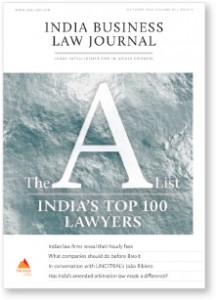A great orator, outstanding scholar and humanist par excellence
The phrases above have been used to describe the legendary Nani Palkhivala, a giant of the Indian legal profession who has left an indelible mark on legal developments in the country. While his story inspires generations of lawyers, discussions on what lay behind his genius and success continue.

This issue’s Cover story (The A-List) presents a list of respected and sought-after lawyers who walk in the footsteps of Palkhivala. And while, unlike Palkhivala, many of them rarely step inside a court, their legal acumen and ingenuity puts them at the top of their game. Our inaugural top 100 lawyers list has been compiled following research conducted in association with the Indian Corporate Counsel Association.
What does it take to be part of this veritable A-list? “An excellent grasp of both legal issues and … the commercial imperatives behind transactions,” says Alasdair Steele at Nabarro while nominating a partner at Khaitan & Co. “Impeccable litigating aptitude … brilliant on-the-feet thinking,” says Shukla Wassan, at Hindustan Coca-Cola Beverages, describing her nominated partner at Karanjawala & Co.
What is clear is that to be one of India’s top lawyers, knowledge and experience may not be enough. What clients look for is the commercial wherewithal and the ability to guide them through the thickets of regulation that criss-cross India. Those who fit the bill include the heads of several of India’s top law firms, including Zia Mody and Cyril Shroff, and less well-known lawyers who, like Promod Nair of Arista Chambers in Bangalore, provide effective work for their clients.
In Asian ambition João Ribeiro, head of UNCITRAL’s regional centre for the Asia-Pacific, discusses the challenges of running the centre and comments on the progress India has made in modernizing its laws. He says that it would be a “natural next step” for India to join the United Nations Convention on Contracts for the International Sale of Goods. The pros and cons of doing so have been long debated and as it stands India and the United Kingdom are examples of countries that have chosen not to join.
In In limbo we turn to the UK and consider what companies should do while waiting for Brexit. Gavin Williams, a corporate partner and part of the Brexit team at Herbert Smith Freehills, advises that now is the time for companies “to do their homework, conduct detailed due diligence and identify the major risks”. As he says, minimizing the impact of Brexit depends on devising alternative structures – physical or legal – so as to ensure businesses remain resilient and robust. Sound advice for in-house counsel steering through the uncharted waters of Brexit.
This issue’s What’s the deal? looks at an area where uncertainties are almost par for the course. Almost a year since amendments to India’s arbitration law that were supposed to streamline the process came into force, problems persist. For instance, because of a lack of clarity in the drafting of the amendment, courts across India cannot agree on how the amendments apply to court proceedings. While most observers see this as mere teething troubles, the reality is that companies facing disputes over commercial contracts in India would benefit greatly from a more certain arbitration regime.
Writing in this issue’s Vantage Point Sourish Mohan Mitra, an in-house lawyer in Delhi, wonders if he has become an “in-house non-practising advocate” due to the requirement that lawyers obtain a certificate of practice that is beyond the reach of in-house lawyers. Mitra argues that the new Bar Council of India (BCI) rules – The BCI Certificate and Place of Practice Verification Rules, 2015 – discriminate against lawyers who chose to work in-house and if such lawyers vote with their feet, it can spell trouble for companies.
Rounding off this month’s coverage is Intelligence report, in which India Business Law Journal proudly presents its 10th annual survey of law firm billing rates. With data from 81 firms of between three and 300 lawyers, this is our largest and broadest sample to date. The result? An increase in billing rates across all categories, even while hourly billing rates continue to be less frequently used and corporate counsel continue to work with their lean budgets.
What of the future? Firms such as Nishith Desai Associates say they are moving towards a “value-billing philosophy”. The firm has what it calls “a happiness billing policy”, which ensures that it works “in the most efficient manner and delivers the highest value to the client”.
While clients will be happy to hear this, there is no telling if they will be any less interested in bargains.


























